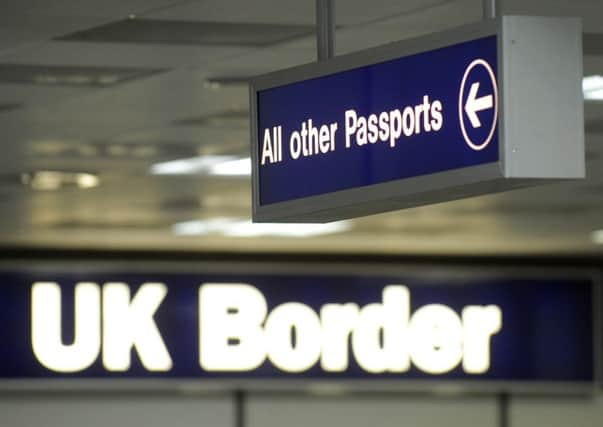Calls for Scottish controls on immigration to grow population


The report from the House of Commons Scottish affairs committee will fuel calls for devolution of powers over immigration to prevent a squeeze on the flow of people after Brexit. Net migration makes up nine-tenths of Scotland’s population growth, with the majority of those settling in Scotland arriving from beyond the rest of the UK.
MPs also said that more must be done to provide young people with jobs, and build up services in rural areas to encourage working-age people to stay in Scotland.
Advertisement
Hide AdAdvertisement
Hide AdThe report warns that, despite reversing decades of population decline, Scotland’s public services are especially vulnerable as the country ages more rapidly than the rest of the UK.
Scotland’s population sits at a record 5.37 million and continues to rise after stagnating from the end of Second World War until the early 2000s.
But despite a fertility rate of 1.62 children born for every woman, more than the European average, the report warns that birth rates alone “cannot provide the population growth that Scotland needs”.
It highlights a projected rise in the “dependency ratio”, with the number of pensions for every working-age person rising from 58 in 2014 to 67 by 2039. The increase will put even greater pressure on the NHS and other public services as budgets are squeezed, while recruitment for hard-to-fill vacancies in health and social care could become even more difficult if immigration levels fall.
And with new income tax powers being devolved to Scotland next year, a decline in the workforce risks slowing economic growth and further eroding the public finances.
SNP MP Pete Wishart, who chairs the Scottish affairs committee, said that the findings show why Scotland should be given powers to set its own immigration priorities, similar to the rights of individual Canadian provinces and Australian states.
Mr Wishart said: “If we fail to keep pace with the rest of the UK, there will be an economic cost to Scotland and an impact on our ability to support our social and economic ambitions.
“Witnesses consistently told us that consideration should be given to a sub-national immigration policy to help us grow our population and more must be done to retain migrants to Scotland, attract migrants from within the UK and encourage more young Scots to remain in Scotland.
Advertisement
Hide AdAdvertisement
Hide Ad“Only through the UK and Scottish governments working together, towards the same goals and using the powers that each parliament possesses, can they make an significant impact on demographic trends.”
First Minister Nicola Sturgeon has made securing powers over immigration a key demand of the post-Brexit settlement, but giving evidence to the committee, UK ministers ruled out any change to the current UK-wide system.
In Canada, provinces share responsibility with the federal government, allowing them to vary entry conditions to encourage immigrants with particular skills, provided they live and work within their host province for a period of time. Australian states are also given some flexibility within the country’s immigration system.
Scotland’s Europe minister, Alasdair Allan, said the report “underlines the need for Scotland to have immigration policies which are tailored to suit our needs and circumstances”.
He added: “Our demographic and workforce needs are different to those of the rest of the UK, and with the recent rhetoric of the UK government as it appears to be moving toward a hard Brexit, I am increasingly concerned its polices will seriously damage Scotland’s population growth.”
Scotland’s population is set to rise by an average of 7 per cent over the next two decades, but with wide variations across the country. Edinburgh, Aberdeen and Stirling are predicted to experience large increases, while the Western Isles are set to see a decline of 14 per cent by 2039, and Inverclyde is expected to lose 12 per cent of its population. Rural depopulation is being fuelled by a lack of jobs, as well as factors such as slow internet connections and being a long distance from health services.
The report also identified a problem retaining young graduates, with large numbers of people from the rest of the UK attracted to Scotland in their late teens and early 20s before an exodus of people aged between 23 and 27.
Mr Wishart added: “Significant population decline is still a worry for parts of rural Scotland. We must work to encourage business to set up in rural areas of Scotland and attract young talented people to those communities.”